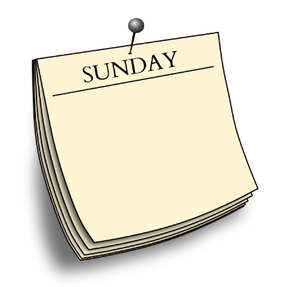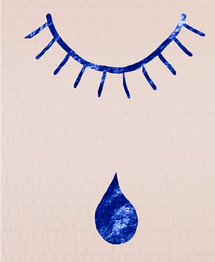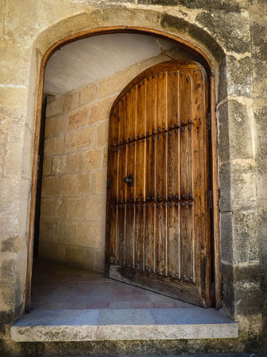 I usually work on Sundays. That’s what I do. That’s what I have done for at least the last decade. I have worked on Sundays. So when I have some vacation time, as I did this past week, I often find myself pondering the meaning of Sundays–asking questions like, “What’s all the hype about?” or “Does Sunday really matter anymore?” And “How do we talk about Sundays without laying a guilt trip on people?”. For me, the importance of a Sunday is tied up in worship and rest. Worship is central to who we are as Christians and is of special significance in smaller congregations. Worship is the place we bring our joys and concerns to be held in a sacred way by those gathered. Worship is the place we hear music that speaks to parts of us that are inaccessible via the spoken word. Worship is where we wrestle with ancient texts that have spoken truths to countless generations, as we ponder what truth this generation might glean from its pages. Worship is where we come together and seek to know God and know one another more deeply. Rest, on the other hand, is essential to abundant life as humans. In our hustle culture, it is even more important to take a break or take a step back, and recharge, renew, and refresh. Rest is a resistance to the strain of maintaining the status quo, creating space that helps us remember, as Tricia Hersey says in her book, Rest Is Resistance: A Manifesto, “We were not just born to center our entire existence on work and labor. We were born to heal, to grow, to be of service to ourselves and our community, to practice, to experiment, to create, to have space, to dream, and to connect.” Rest, then, is the action and the inaction that helps us be who we were born to be. But these things–worship and rest–aren’t so much about the calendar day of the week, so much as they are about the practice of Sabbath. Many religious people–both inside and outside of Christianity–have an understanding of Sabbath–even if they call it something else. And while Sabbath has generically been understood as a day of rest, I submit that it is more of an invitation. Toni Ann Reynolds explains, “Sabbath is an invitation to healthy freedom. Freedom to decide what element(s) of your weekly life hinder, or simply strain your relationship with God. Whatever the answer is, that’s the thing that should be put on rest. If not for a full day, then after 5pm; or before noon each day. Ultimately, rules aside, it is up to each of us to govern ourselves in a way that keeps us moving in the Light of Love.” I love that way of looking at Sabbath because it allows for evolution and growth and for things to be true for a season, and then true no more. I love thinking of Sabbath as an intentional reflection on my relationship with God, and a summons to live in such a way that keeps me moving in the Light of Love. I love understanding that Sabbath can happen beyond a given day on the calendar, while fully filling a specific calendar day with more light and truth and hope than a heart can hold all at once. What I realized on my Sunday off work is that what some people say is true, “Sunday is just another day.” And, I realized that it doesn’t have to be. Sundays can be a time where we decide what elements of our weekly life hinder, or simply strain our relationship with God. Sundays can hold great depth, connection, and solace during worship and in opportunities for fellowship. Sundays can also hold the opportunity for rest. For refraining from connection with anyone or anything but the Divine. And all of it is holy. All of it is sacred. Don’t get me wrong, I think gathering together on Sunday mornings to worship is SO important. And, I also know that sometimes all that comes with a Sunday morning–getting up, getting ready, getting to the church, getting prepared to have people talk to you, getting prepared to participate, getting prepared to listen to the pastor talk–all of it–can sometimes get in the way of that healthy freedom to which we are called. And so, when given the choice between Sunday and Sabbath, I encourage you to keep Sabbath. Often these will coincide, but sometimes they won’t. Sometimes they simply can’t. And there is no judgment here. Only an invitation to be intentional about our connections to the Divine and to one another. To be intentional about putting to rest what needs to be put to rest. To be intentional about moving in the Light of Love. Learning to be intentional about connection with you, Pr. Melissa  This morning as I had my usual cup of coffee on the front porch, I cried. I had been watching videos earlier in the morning, and had come across a video about a German shepherd who was a service dog for a veteran. The service dog was taking his last flight home after being diagnosed with an incurable disease, and the flight crew was honoring him on his last flight. Just thinking about it as I sipped my coffee and looked out over the fresh new day before me was almost too much to bear. I’ve had a lot of these moments lately–instances when a song, some writing on a piece of paper, or something that someone says will remind me of someone I’ve loved and lost, or will transport me back to a time that I lived, loved, and have had to let go. Almost without warning, the tears will come. and, along with them, so will the judgment and the apologies. I’m not sure when I and so many of us developed such a posture toward tears–a kind of ritual that begins with droplets of grief or joy or remembrance leaking from our eyes and ends with either self-judgment or an apology. All I know is that is what so often happens. We cry–for a reason known to us or a reason completely hidden from us, and immediately we think ourselves weak. We tell ourselves that whatever has caused us to cry is something that “happens everyday” and something we should “just get over already.” We make some binary, gendered comments like “boys don’t cry” or “girls cry over everything.” Or, we scan the group around us and decide that an apology is more appropriate. As if we are inconveniencing others with the discomfort they might feel from bearing witness to our pain. As if tears were somehow a crime against the polite company we so often try to keep. But what if I told you that tears weren’t always seen this way? Our spiritual ancestors, the Desert Mothers and Fathers, viewed tears as a gift. Something cleansing, sure, but something far deeper than “just a good cry.” In his book “Soulmaking,” author Alan M. Jones explains, “The desert tradition claims a great deal for the power of tears. Tears are agents of resurrection and transformation. It may be difficult for us to grasp the association between weeping and the bursting forth of new life. Something positive is released when tears flow. The common expression 'to have a good cry,' comes close to what is meant by the 'gift of tears;' at least it is a way of beginning to understand their liberating and cathartic effect. The 'gift of tears,' however, is concerned with something much more radical, threatening, and life-bearing than the occasional and necessary release from tension that 'having a good cry' affords. The tears of which the desert bears witness are not tears of rage, self-pity, or frustration. They are a gift, and their fruit is always joy." What if, in shutting down our tears with judgment or apologies, we are shutting down the transformation and resurrection that they can lead to? What if, out of fear of being vulnerable for a moment, we are robbing ourselves of the joy that can burst forth from our tears? What if crying is one of the ways we become more fully human, and allow those around us to do the same? What if tears aren’t weakness and grief isn’t something that we just need to get over? What if tears are the vessels that help bring us to new life? Might we then see them as something as sacramental as bread and cup? I imagine we would. So dear friends, when you need to, let the tears fall. And as they do, try to let them happen without judgment and without apology. Practice welcoming them as the gift that they are: Outward and visible signs of an internal grace that are cutting path in our hearts, our minds, and our very lives toward healing, wholeness, and new life. Learning to see the gift of tears with you, Pr. Melissa  As many of you know, after 3 years of pandemic living without a positive COVID-19 test, the coronavirus officially hit our house 2 weeks ago. Since the day my spouse and I got our positive test results we have been quarantined, rarely leaving the house except to go outside with our dogs or to get groceries via contactless pickup. We worked from home, (what a privilege, I know!) and we cooked at home. We read books that we had at home, and even watched ridiculous television on streaming services–all at home. And then, just like that, the symptoms decreased and we tested negative. As quickly as we had been thrust into quarantine life, we were thrust back out. We had crossed a threshold into illness and all that it required of us, and now, we have crossed a threshold again. All without the heavens ever stopping to ask us if we were actually ready to cross that threshold. All without our permission or consent for the universe to change our lives. Thresholds are like this though. John O’Donohue says that “To acknowledge and cross a new threshold is always a challenge. It demands courage and also a sense of trust in whatever is emerging. This becomes essential when a threshold opens in front of you, one for which you had no preparation.” In other words, thresholds will take us from here to there, whether we are ready for the change or not, but such changes are not a cause to panic. Which, I know, is a thing that is easier to talk about than it is to live out. Because change isn’t always about emerging from an illness or a quarantine or a separation. Sometimes the thresholds we cross take us to a place of uncertainty, of loss, of loneliness, of dis-ease. John O’Donohue puts it this way, “Think for a moment how, across the world, someone’s life has just changed–irrevocably, permanently, and not necessarily for the better–and everything that was once so steady, so reliable, must now find a new way of unfolding.” One of the great unknowns of our very human existence is when and how change will come. The only thing we know for sure is that it will. And when it does–no matter how earth-shattering, or life-altering or mundane it is–as we step across the threshold from what was to what will be, we have at our fingertips both an opportunity and a promise. The opportunity to trust–even if our hearts are breaking or our will is tattered and our spirits shake. And the promise, as John O’Donohue says, “That whatever comes, the great sacrament of life will remain faithful to us, blessing us always with visible signs of invisible grace.” So maybe that is our task, dear friends: To look for those visible signs of invisible grace that are holding us as we cross life’s thresholds. Perhaps our work is not to fight the winds of change or to try with everything we’ve got to side-step the throughways of our lives, but instead to open our eyes, our hearts, and our minds as we step into them and see how and where and in whom grace is present. I don’t know, but I think it’s worth a shot. Looking for visible signs of invisible grace with you, Pr. Melissa |
Rev. Melissa Sternhagen
Rev. Melissa Sternhagen was called as the pastor of St. Paul Congregational UCC in June of 2020. Prior to her call to St. Paul, Pr. Melissa worked as a hospice chaplain in the Ames, IA area, following pastorates at rural churches in Central Iowa and Southern Illinois. Pr. Melissa is a second-career pastor with a background in agribusiness and production & supply operations. She received her M.Div. from Eden Theological Seminary in St. Louis, MO, and holds a MA Ed. in Adult Education and Training, and a BA in Organizational Communications. Archives
July 2024
Categories |

 RSS Feed
RSS Feed
